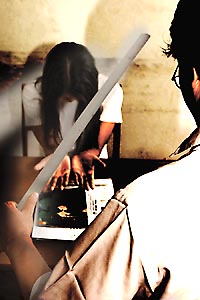Myanmar Times, Yangon, 28 June 2004Getting the caneBy Aung Kyaw
"NO one dared to move or even raise their eyes. The teacher was pacing up and down the classroom tapping his cane on his open hand as he went. The teacher ordered the class to stand up and as the frightened children did so, the teacher caned them." "In those days, I hated my teacher because he would beat us severely whenever we hadn't done our home work. Now I realise that if he had not given us the cane, we would not have become the educated people we are today," Ko Aye Tun, a civil engineer, said. Traditionally, Myanmar people learn from a young age to revere their parents and teachers. It is their job to educate children and teenagers and make sure they get the best start in life. Parents and teachers are responsible for the cultivation of a child's talents, personality and manners and at times children will need to be disciplined. For this reason caning, an example of corporal punishment, is commonly used by parents and teachers alike as a means of punishment. Some people believe caning is effective and many believe it is not. Kyaw Kyaw Oo, a final year student of University of Distance Education, said, "Caning is not a good solution for problems with students. For example, when I was young, some of my classmates bullied me. We started fighting and a teacher came to the scene." "Although I was not the troublemaker, I got the cane as did my friends. It hurt me very much and I think that incident made me less confident. I do not believe in caning," he said. But another university student said he believed caning was justified. "My friends and I played truant when we were in the eighth standard. The teacher caned us many times on the buttocks in front of the class because we hadn't listened to him when he warned us about being absent," he said. "When I returned home, my father beat me badly again. From that day onward, I was afraid of staying away from school again, so sometimes caning really works with students who do not listen to their teacher." Daw Than Than Nu, a university lecturer, said she believed caning was acceptable in some circumstances. "Caning should be used thoughtfully because it can hurt a student physically or mentally. We can teach some students to behave well by using soft words, but for those who don't listen to a teacher's warning, the only thing we can do is to cane," she said. While child laws, laid down by the Ministry of Social Welfare, Relief and Resettlement, allow provisions for teachers and parents to use disciplinary matters that benefit a child, the government has shown it is against corporal punishment, Professor Dr Daw Khin Aye Win, general secretary of the Myanmar Women's Affairs Federation, told the Myanmar Times. "The government has issued directives three times, starting from the 1950s saying there shouldn't be any corporal punishment in schools," Dr Daw Khin Aye Win said. "Even now representatives from the ministry of education . . . say action has been taken against teachers who use corporal punishment. "When I explain [to people] the negative consequences of this corporal punishment, and that it hinders the development of the child, some people accept it and some don't." One female teacher said she often uses the cane in her classroom. "I have to cane the boys all the time because they are so disobedient. The girls are better behaved because they are more sensitive than the boys, and they are afraid of being punished," she said. A female medical student explained that while nobody wants to be beaten, they understand why their teachers and parents do it. "If a teacher punishes us, we should accept it as a benevolent act, because we believe that teachers do it not because they hate us, but because they love us," she said. But teacher U Nyi Htet said he does not think teachers should cane their students while they are angry. "When we get angry, we shouldn't punish students in that way because they will only see our anger, and not their fault. As far as possible we should try to make the student understand that he or she has done wrong, remembering that the purpose of a punishment is not to humiliate the child," U Nyi Htet said. Copyright © 2004-2005 - Myanmar Consolidated Media Co. Ltd. All rights reserved. |

